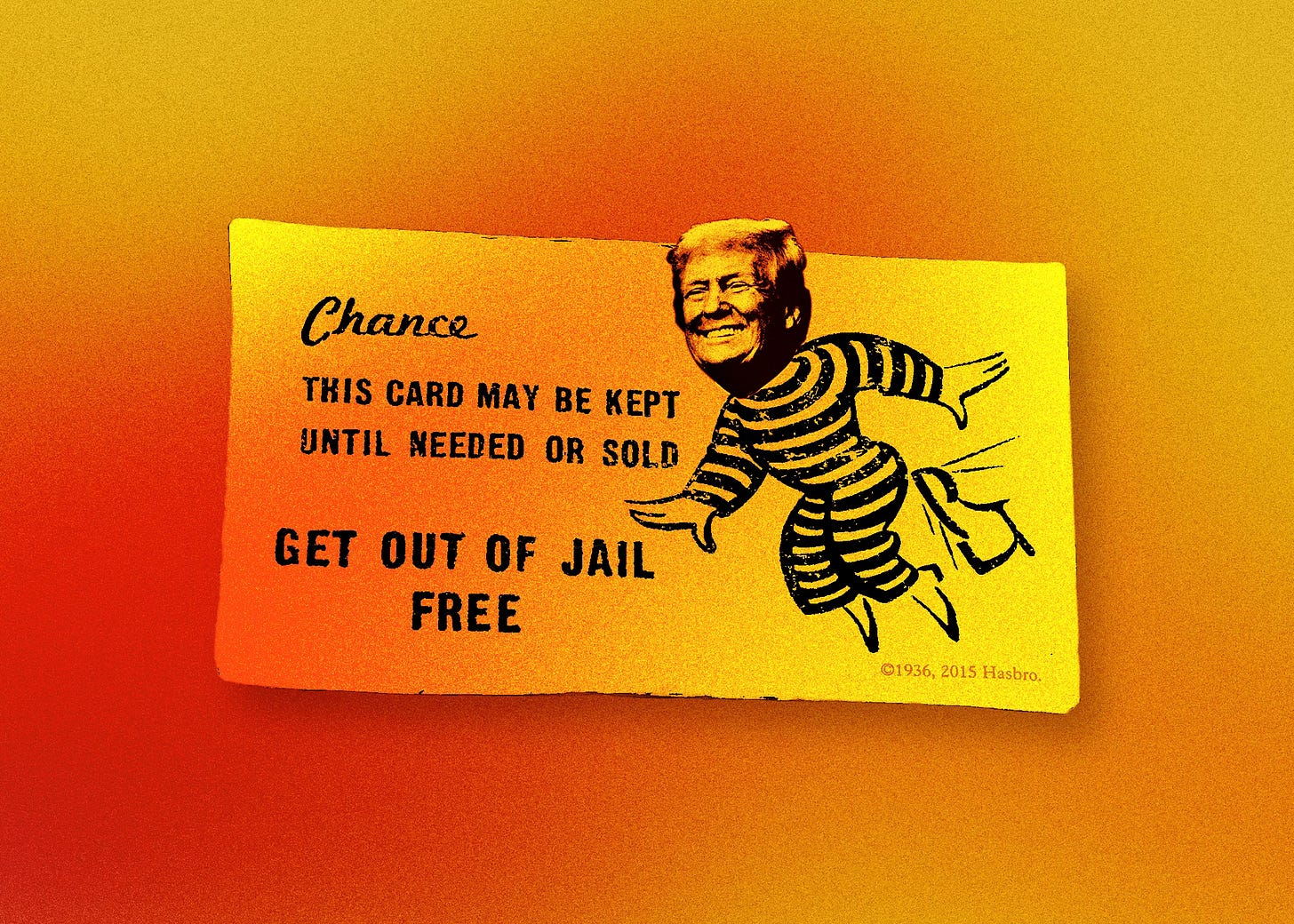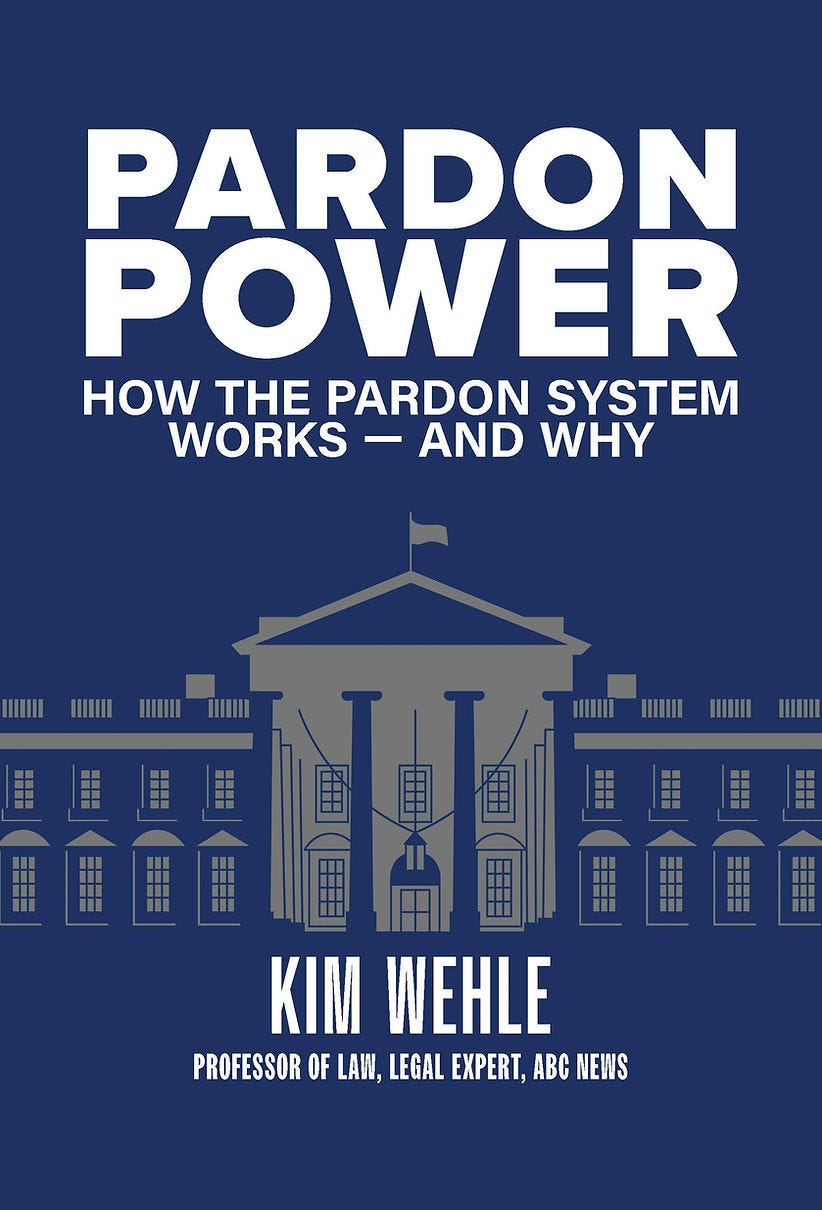Can the President Pardon Himself?
Logic says no, but the precedent isn’t as clear.
[This article is excerpted from Kim Wehle’s new book Pardon Power: How the Pardon System Works—And Why, just published by Woodhall Press.]
DONALD TRUMP IS THE FIRST PRESIDENT to realistically present the country with the possibility of a self-pardon. Presumably, if he had issued a preemptive self-pardon before leaving office in 2021, he would have pleaded it in his two federal trials: one in Washington, DC, for his plot to overturn the 2020 presidential election, and another in Florida for mishandling classified documents after he left office. (No presidential pardon, from himself or any other president, would shield him from his prosecution in Georgia state court for trying to overturn the 2020 election there or in New York state court for falsifying business records to cover up a campaign finance violation, for which he was convicted on 34 counts in May.) If Trump wins the 2024 election, it becomes much likelier that, for the first time since the Constitution was ratified in 1789, a president will issue a pardon to himself, or at least try to.
Whether a self-pardon during office would protect a president from criminal liability after leaving office has never been tested, although Richard Nixon reportedly considered it. Governors have pardoned themselves, including the first governor of the Territory of Washington in the Pacific Northwest, Isaac Stevens, who had declared martial law and closed the courts after a judge questioned an executive order he issued. Whether the Supreme Court would uphold a president’s self-pardon is difficult to predict.
No court has considered the question of whether presidents can pardon themselves, even for crimes committed in the Oval Office. Article I, Section 3 of the Constitution states of impeachment, which is the most attainable remedy for presidential wrongdoing in office: “the party convicted shall nevertheless be liable and subject to indictment, trial, judgment and punishment, according to law.”
Given that impeachments cannot be pardoned under Article II, the impeachment language—which makes former presidents subject to the criminal laws for impeachable conduct—could be read to suggest that crimes related to impeachments cannot be pardoned, either. Trump was impeached for his role in the January 6th insurrection, with the House of Representatives charging him with “incitement of insurrection” against the U.S. government and “lawless action at the Capitol.” Arguably, then, any crimes arising from the same conduct would be immune from a self-pardon.
In addition, Section 3 of the Fourteenth Amendment holds that “[n]o person shall . . . hold any office, civil or military, under the United States . . . who, having previously taken an oath . . . to support the Constitution of the United States, shall have engaged in insurrection or rebellion against the same, or given aid or comfort to the enemies thereof.” A self-pardon for Trump’s actions listed in the January 6th indictment could clash with the Supreme Court’s long-standing recognition that pardons cannot undermine other parts of the Constitution. The Justice Department’s Office of Legal Counsel opined in August of 1975—during Nixon’s presidency—that “[u]nder the fundamental rule that no one may be a judge in his own case, the President cannot pardon himself.” Constitutionally legitimizing a self-pardon for January 6th should therefore be unthinkable. (At least, one would hope.)
In justifying a broad pardon power for the president, Alexander Hamilton assuaged detractors in Federalist No. 69 by saying that the president’s power would be “much inferior” to that of the despised King George III. “The person of the King of Great Britain is sacred and inviolable,” he explained, as “[t]here is no constitutional tribunal to which he is amenable; no punishment to which he can be subjected without involving the crisis of a national revolution.” Whether Hamilton was correct, or whether modern presidents have, in fact, become kings is a question that Trump’s record of epic wrongdoing in office has forced the country to face head-on.
It bears mentioning, too, that at the Constitutional Convention, the Framers debated adding “after conviction” as a condition to the pardon power, but decided against it on the rationale that pardons before conviction might be necessary to obtain the testimony of accomplices to a crime—something that is routinely accomplished today by prosecutorial grants of immunity to cooperating witnesses, without resorting to pardons.
President Gerald Ford’s famous preemptive pardon of Nixon before indictment was never tested in the courts. Nonetheless, it set a historical standard for pre-conviction pardons, which rarely occur outside the United States. No state constitution mentions self-pardons. Under state constitutions that require the assent of the legislature or another government body to issue a pardon, a unilateral self-pardon is impossible.
Self-pardons did not exist in England, either, because in theory the king could not commit a crime against himself. And while impeachment is a feasible response to a self-pardon, that assumes a president is still in office. Once he leaves, impeachment no longer applies. It would be up to the criminal justice system and the courts—versus Congress—to decide whether a presidential self-pardon is legally sound or whether the adage that “no one is above the law” holds true in America.





